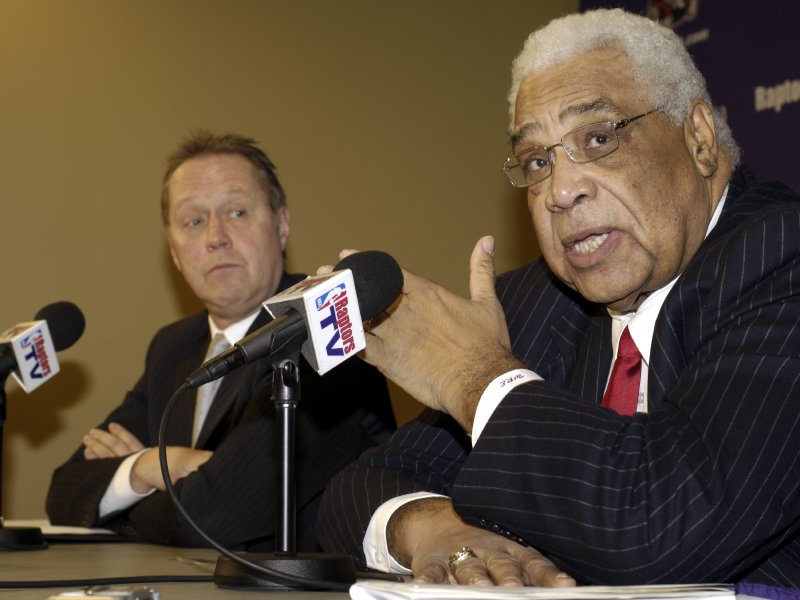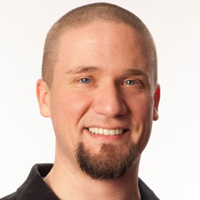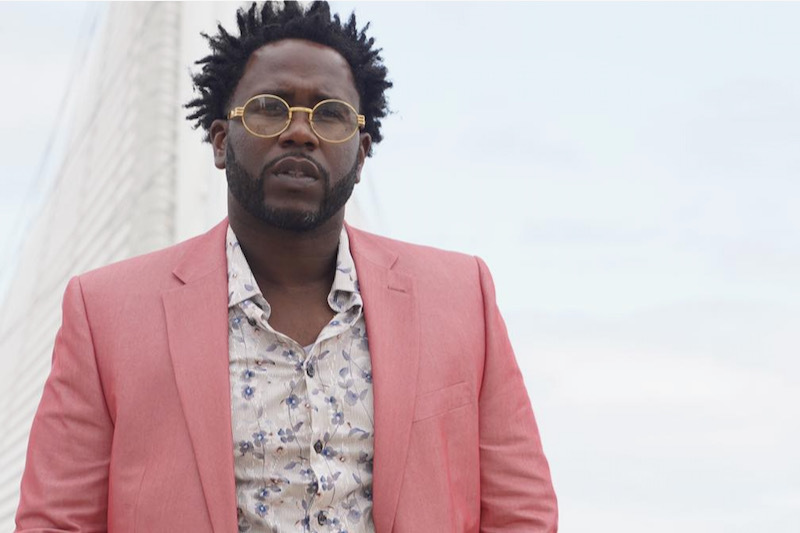Four decades ago, the Milwaukee Bucks and Wayne Embry made history when the organization offered – and he accepted – the position of general manager.
Just three years prior, in 1969, Embry finished his playing career for the expansion Bucks, a career which included five all-star appearances and one NBA title with the Boston Celtics.
Suddenly, he was the first African-American GM not only in the NBA, but in all professional sports.
In recognition of that achievement, Embry was back in Milwaukee recently to be honored by his former teammate and fellow Hall of Famer Oscar Robertson with the Legends Award, which was presented during the Fellowship Open at Silver Spring Country Club in Menomonee Falls last week.
OnMilwaukee.com caught up with Embry, currently a senior basketball advisor with the Toronto Raptors, to talk about his pioneering role in the game, acquiring Robertson and trading away Kareem Abdul-Jabbar and how Michael Jordan prevented him from winning more championships in the 1990s.
OnMilwaukee.com: You're a Hall of Famer, you've been recognized for other off-court accomplishments – what is like to continue to be recognized for what you've accomplished like the Legends Award?
Wayne Embry: You're always appreciative that people recognize. As you get older you don't think much about what the consequences might be or what honors might come forth when you're doing it back during the day. But as you get older and you reflect back, it's just nice to know that there are those who appreciated what you've done. All the while we were in Milwaukee we came here as a player – I say "we" because my wife is very much a part of it – played a year, retired, went back to Boston and had a city job and not knowing what the future was. I did some color on the Celtics broadcast but I didn't know if broadcasting was going to be the future or what. I didn't have a clue what the future might be. Then (owner) Wes Pavalon came here later and asked me to come back to the front office. That was the defining moment in my life.
All the while I played offseason things with kids around here, clinics around the city in Cincinnati and Boston. I was there as the director of recreation – I started the Boston neighborhood basketball league which is still going strong – and when I came here I thought it was important to be involved in the community. The community embraced us and I wanted to return that and embrace them and make any contribution I could to the community and I've always encouraged our players to do the same, to be a part of the community where they played. It would be kind of mutual.
OMC: Do you feel like a pioneer?
WE: I feel that way only because people tell me I was! You just accept things as they come and you try to do the best you can and as you get older you reflect back and say "Wow, guess I was." I have that kind of attitude.
OMC: Former teammate and Bucks guard Oscar Robertson presented you with this award – does that add to the experience?
WE: I'm very appreciative that he accepted the role of presenting me. Oscar and I were roommates when we played together in Cincinnati and our families are very close and he meant so much to me as a player. He advanced my career as a player because of his greatness. Greatness defined is making other players better on your team and he certainly did that and did that with me. He encouraged me to the best I could be because he set a standard. If you responded to what his demands were and the challenges he presented to all of us on the team, we could probably be a better team. We were pretty good but we just couldn't beat the Boston Celtics.
Then in later years, when I was in the process of making the decision – after I was asked back here in the front office – Wes Pavalan said to me when he came to Boston to talk to me, "Oh by the way we're negotiating a trade for Oscar Robertson, would you mind giving him a call and give him a little bit of encouragement since you're coming back? What do you think of that?" I said if you get Oscar Robertson it'll be an instant championship. So I was kind of a prophet as well!
He said, "do you mind calling him," and I said, sure, "I'll call him." I called Oscar and told him the great experience we had here in Milwaukee and that I think he deserves to win a championship and you hadn't won anything until you won a championship and I said, by the way, I'm coming back to the front office and it'd be great. So we moved back here together.
OMC: How special were those years, from 1970 to 1975, which included a championship and another finals appearance?
WE: It was just great. A small market team advancing as we did. Of course we had great players. I often tell people when I launched my career as general manager how could you fail when you start with Oscar Robertson and Kareem Abdul-Jabbar and Bobby Dandridge? That's three great players who were already in place. The way the city responded was just amazing. They responded to us in our expansion year here (in 1968-69), I was just overwhelmed by the fan support even though basketball was coming into Packers land. We didn't know how it was going to be accepted or received, I should say. We were received with great enthusiasm and it was kind of an inspiration the way people came down to the old Mecca and supported us. The expansion year I think we exceeded expectations and I'm proud to be a part of that and I'm proud to have been captain of the team. I think that was my main purpose here, to provide veteran leadership to the other guys. Then, of course, bringing Oscar on board to go with Kareem and Dandridge and the rest, that was it. The fans responded well. It was just amazing as I look back on it.
OMC: Talk about having to move Kareem Abdul-Jabbar after the 1974-75 season.
WE: I think Kareem, when he announced to us that he wanted to be traded, it kind of deflated our mood at the time but it had been (six) years of just great basketball, a championship and almost another championship. It was my feeling – and I presented this to the board – that we should honor his desire out of respect to him. Of course part of that was he could've become a free agent after that and moved on anyway. But we were able to salvage enough pieces, talented players, to begin the next era. We came out of that just fine.
OMC: You mentioned that as a player in Cincinnati you couldn't get past Boston to win a title, and the same thing happened when you were the GM of the Cleveland Cavaliers from 1985 to 1992. You built some really talented teams, but a certain bald guy in Chicago prevented you from maybe capturing more championships.
WE: We tried to do the best we could, to put together the best product as possible and it was unfortunate during that time that Michael Jordan emerged in Chicago and the Bulls did a terrific job of complimenting him with some pretty good players in Scottie Pippen and Horace Grant, (Bill) Cartwright and guys like that. But it was Michael's greatness that propelled him to the dynasty that they were. You're right – here I am faced with greatness like we were in Cincinnati against Boston – and so we're facing it in Michael and somehow if we could've gotten by them once it would've changed things for us. I thought, at the time, we had the best team in the league one through 12, but we just couldn't overcome Michael's greatness.
OMC: You've been in the NBA in some capacity since 1958 – what's the biggest change you've seen?
WE: One big difference is you see the mega teams, like Miami and now it looks like L.A. is trying to follow. I wouldn't say the players are bigger and stronger – I think there's more star quality in the players have established winning like LeBron James, Michael (Jordan), Kobe (Bryant) and with expanded media you get more exposure. As a historian as well, having played it, if the Elgin Baylors and the Oscars and going back further in history to the Bob Pettits, Bill Russells, (Wilt) Chamberlain, guys like that, that era would compare with the players today.
Someone asked me to compare the Dream Team (of 1992) with this current team and I said, well, can we throw the '60 Olympic Team in there as well? That was a pretty good team, too. If you consider (Jerry) West, Robertson, (Jerry) Lucas, (Walt) Bellamy, you know. Then of course we couldn't put together NBA players and had to take players from the Armed Service. You had Bob Boozer. That was a pretty good team, too, and had a great, legendary coach in Pete Newell. The guy said 'I never thought of that' and I said of course you didn't.
OMC: You mentioned the super teams – which is something you're going up against now in Toronto – people here in Milwaukee and these mid-markets, fans get frustrated. Is that bad for the league?
WE: I tell you, it's been a great experience in Toronto for me and I encourage players to really take a hard look at it when we draft them. Part of the process in drafting and vetting is that you want players that are strong enough in character that will allow them to adapt to their environment, whatever that may be. I think Toronto's terrific to play and live, so we're in the process of convincing our players when they come there to just be patient, you'll love it here. That's what I did in Milwaukee. I've always managed in small markets and it was the same thing – a lot of players have stayed here (in Milwaukee).
Notwithstanding Kareem back then, which was quite understandable given his profile and that sort of thing, but that was a learning experience for me because I didn't want it to happen again. I convinced our owner that it may take a little longer, but in our vetting process what I'm going to try to do is get players that are indigenous to small markets, the Midwest players who don't need the glamor of the large city or the large market, and I think that we'd build something and we'd get players how had the character to respect where they are and we tried to manage accordingly. It takes a little longer, but it can be done. And it's more gratifying when you do it.
OMC: Finally, what's your assessment on this new-look Eastern Conference? The Heat are re-tooling as the defending champions. Dwight Howard is gone, Derrick Rose is injured, Brooklyn has a new look. Maybe some new teams, like the Bucks, are being brought into the playoff mix.
WE: The Knicks will be better, Miami is going to be Miami. Orlando will probably back up a little bit. Atlanta could possibly back up a little bit. Chicago, without Rose, will be ... so there are opportunities for the Bucks, for Toronto, to succeed. Ti's just a matter of taking pride in yourself, making the commitment and taking advantage of it.
Jim Owczarski is an award-winning sports journalist and comes to Milwaukee by way of the Chicago Sun-Times Media Network.
A three-year Wisconsin resident who has considered Milwaukee a second home for the better part of seven years, he brings to the market experience covering nearly all major and college sports.
To this point in his career, he has been awarded six national Associated Press Sports Editors awards for investigative reporting, feature writing, breaking news and projects. He is also a four-time nominee for the prestigious Peter J. Lisagor Awards for Exemplary Journalism, presented by the Chicago Headline Club, and is a two-time winner for Best Sports Story. He has also won numerous other Illinois Press Association, Illinois Associated Press and Northern Illinois Newspaper Association awards.
Jim's career started in earnest as a North Central College (Naperville, Ill.) senior in 2002 when he received a Richter Fellowship to cover the Chicago White Sox in spring training. He was hired by the Naperville Sun in 2003 and moved on to the Aurora Beacon News in 2007 before joining OnMilwaukee.com.
In that time, he has covered the events, news and personalities that make up the PGA Tour, LPGA Tour, Major League Baseball, the National Football League, the National Hockey League, NCAA football, baseball and men's and women's basketball as well as boxing, mixed martial arts and various U.S. Olympic teams.
Golf aficionados who venture into Illinois have also read Jim in GOLF Chicago Magazine as well as the Chicago District Golfer and Illinois Golfer magazines.




.jpg)


